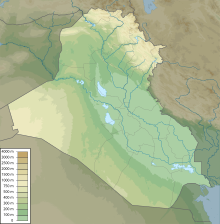Battle of Dujaila
| Battle of Dujaila | |||||||
|---|---|---|---|---|---|---|---|
| Part of the Mesopotamian Campaign of World War I | |||||||
|
|||||||
| Belligerents | |||||||
|
|
|
||||||
| Commanders and leaders | |||||||
|
|
|
||||||
| Strength | |||||||
| 18,891 infantry 1,268 Cavalry 68 artillery pieces |
8,500 infantry 1,500 cavalry 32 artillery pieces |
||||||
| Casualties and losses | |||||||
| 3,500 casualties | 1,290 casualties | ||||||
|
|
|||||||
The Battle of Dujaila (Turkish: Sâbis Muharebesi) was fought on 8 March 1916, between British and Ottoman forces during the First World War. The Ottoman forces, led by Colmar Freiherr von der Goltz were besieging Kut, when the Anglo-Indian relief force, led by Lieutenant-General Fenton Aylmer, attempted to relieve the city. The attempt failed, and Aylmer lost 4,000 men.
Throughout most of 1915, the Anglo-Indian expedition, designated Indian Expeditionary Force D, had advanced up both the Tigris and Euphrates rivers. Originally dispatched to capture the Shatt al Arab and Basra, to protect the British oilfields in Iran, Force "D"'s mission in Mesopotamia expanded gradually as local commanders saw a chance for victories which would burnish the British Empire's prestige in the Muslim world. At the battles of Qurna, Nasiriyeh, and Es Sinn, Force "D" defeated elements of the Ottoman Sixth Army. After the Battle of Es Sinn, the Anglo-Indian force controlled the Tigris and Euphrates rivers through much of what is now southern Iraq. Sensing that Baghdad was within their grasp, the commander of Force "D", supported by the Commander in Chief, India, in Simla, argued for permission to launch a final offensive to capture it. The situation looked promising. The nearest Ottoman reserves, according to British intelligence, were 400 miles (640 km) distant in the Caucasus or 250 miles (400 km) away at Aleppo in Syria. All that blocked the way to Baghdad were two demoralized, defeated divisions.
In London, the India Office was staunchly opposed to a further advance. Secretary of State for India, Austen Chamberlain was concerned that even if Baghdad could be captured, it would only be lost again because no other troops were available to reinforce Force "D". Eventually, the question of a further advance was taken up by Asquith's War Cabinet. Despite warnings from the Imperial General Staff, the decision to advance was given.
...
Wikipedia

